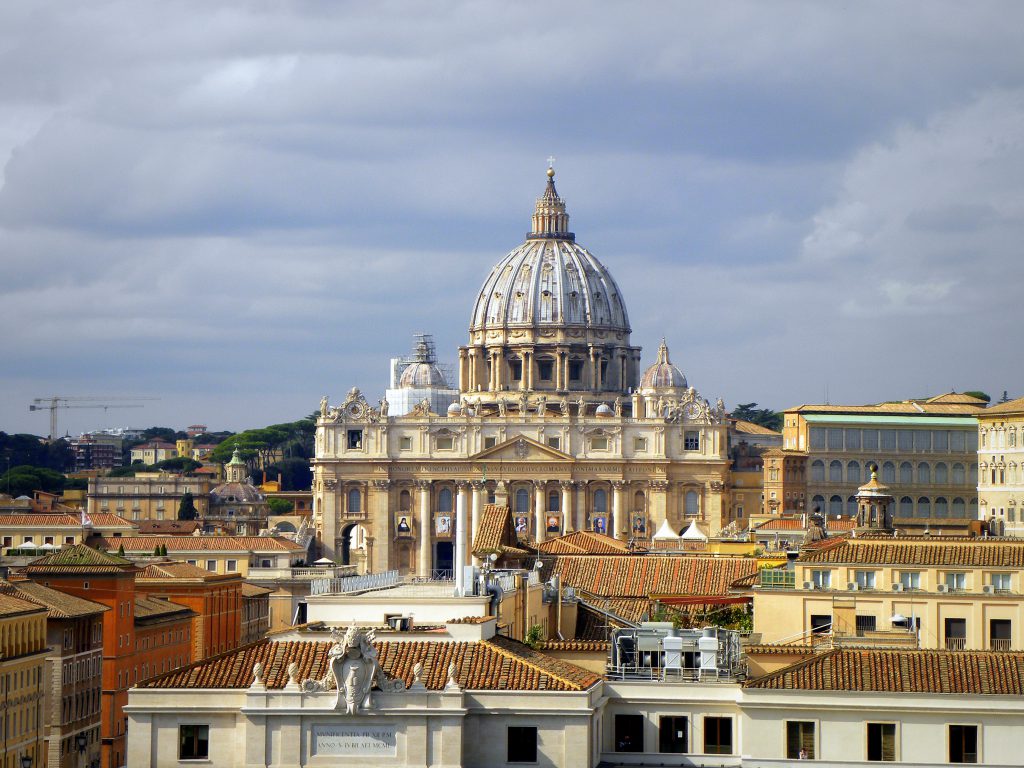
Published September 2020
In the Catholic Church, synods of bishops are complex bits of theater. The pope sets the theme, observes the proceedings, and writes the “apostolic exhortation” that translates a synod’s work into teaching. Some post-synodal texts, such as Paul VI’s Evangelii Nuntiandi (“Evangelization in the Modern World,” 1975), are brilliant. Others, such as Pope Francis’s document Amoris Laetitia (“The Joy of Love,” 2016), are more problematic. The role of synods is consultative, not legislative. At their best, they provide a forum for bishops from around the world to meet at the Vatican for several weeks, discuss freely and frankly issues facing the Church, and advise the pope accordingly.
Or, that’s the theory. The reality is that synods are always to some degree stage-managed. I staffed a bishop as he served as a delegate to three different synods. The first was the Special Assembly for America in 1997; the second was the Synod on the Family in 2015; the last was the Synod on Young People and the Faith in 2018. Working off-site in Rome for a synod delegate is an interesting exercise. One experiences the drama indirectly, but nonetheless vividly, through the perceptions of the delegate one serves and his close synod colleagues. Like-minded friends and allies from the various synod language groups add to the color. So do the many media analysts and unofficial lobbyists who swarm the event.
In general, goodwill governs a synod’s proceedings. But the Church in the current epoch faces serious issues. These, in turn, produce serious differences. Despite pious denials, factions tend to develop in every synod. And serious differences can produce ingenious efforts by those factions to guide a synod’s results toward a preferred end. Thus, surprises can sometimes happen, like the miraculous emergence of “synodality,” an arcane theological concept that suddenly bubbled up from nowhere as a matter for delegate approval toward the end of the 2018 synod on youth. Figuring out how and why such curious things occur takes skill at networking, an eye for separating fact from rumor, and the professional credibility to get delegates and curial officials talking off the record.
George Weigel possesses all these things. In a time of ongoing Church divisions and a decline of traditional religion in the so-called developed world, observers of ecclesial life too easily descend into cheap polemics. Weigel’s work is the opposite: a consistent body of measured and sound analysis. He is also—and this quality is vanishingly rare—a man who respects the personal dignity of those with whom he disagrees. I watched Weigel in action on a daily basis at the 2015 and 2018 synods. He was among the best-informed commentators on the events.
His knowledge and authority, drawn from extensive direct experience of the Vatican during three pontificates, have long enriched his writings as well. Weigel’s best-known book is Witness to Hope, his biography of Karol Wojtyła, now St. John Paul II. No future scholar will be able to write on John Paul II, one of the pivotal figures of the twentieth century, without consulting it and Weigel’s follow-up volume, The End and the Beginning. And yet, as significant as these books are, I find myself returning to two smaller volumes by Weigel—The Cube and the Cathedral and Letters to a Young Catholic—more frequently.
Writing “small” but well is a particular gift. Anyone can produce a river of words. Making the words matter is another story. Such is the nature of Weigel’s new book, The Next Pope. Taking account of the challenges facing the Church in the third millennium, and drawing lessons from the pontificates of John Paul II, Benedict XVI, and Francis, Weigel systematically outlines the qualities needed in the next successor of Peter.
Weigel’s assessment of the state of Catholic affairs is sobering. But those who blame Vatican II for the problems in today’s Church will come away from The Next Pope unhappy. Weigel offers a compelling defense of the council, while seeking to lower the temperature and raise the level of intra-Church debate.
Likewise, anyone trawling for criticism of the current bishop of Rome would do well to shop elsewhere. The Next Pope is scrupulously respectful of Pope Francis, linking him organically and persuasively to his predecessors in the development of Catholic life since Vatican II. As Weigel notes, though Francis did not take part in the council personally, he did experience the full force of Vatican II and its aftermath as a Jesuit priest and superior in Argentina. As pope, Francis inherited a conflicted conciliar generation that is now exiting the stage. Thus, the next pope will have had no adult experience of the council. For him, unlike his predecessors, Vatican II will be an event located in history; he will have no personal memory of the times, circumstances, and personalities that produced it. Accordingly, Weigel’s eye is primarily on the horizon of Church life over the next several decades, not on the rearview mirror.
In Catholic thought, the pope is not a czar. He does not invent doctrine. He cannot change Church teaching in a manner discordant with Scripture and Catholic tradition. The obedience owed to any pope is similar to the mutual obedience of spouses: It is a form of love, not unthinking servility, and it has limits defined by a shared obligation to truth. But the pope does play a vital role in ensuring the unity of the Church, securing the fidelity of her belief, and guiding her into the future. As Weigel notes, the Church is a community of disciples on mission—a mission to convert and sanctify the world in the name of Jesus Christ. The Christian faith is not merely one path to God among many fruitful paths available to humanity. It is the true and best path. The privilege and duty of evangelizing are conferred on every person who receives baptism. But too often today, the burning sense of urgency natural to Christian discipleship, the interior fire that powered a Paul, a Teresa of Ávila, or a Francis Xavier, has cooled to a tepid habit of Sunday Mass attendance, or disappeared altogether.
The Next Pope explains how the Church can deal with salt that has lost its flavor. It also reminds us of the faith’s explosive growth in the young churches of the global South—success that demands support and prudent shepherding from the See of Peter. As Weigel stresses, the Office of Peter is crucial to the Church’s tasks of responding to today’s crisis of human identity and purpose, reforming and strengthening the ministries of bishops and priests, and restoring the missionary nature of the lay apostolate. A serious reform of the Vatican itself is also overdue, requiring that “personnel and financial resources be redeployed where they are most needed,” and involving “lay management expertise” and a serious commitment to more “collaborative governance.” Likewise needed are a renewal of ecumenical and interreligious dialogue and a forceful, independent, truth-centered new engagement in world affairs.
All of these high-sounding phrases, of course, are just tall words, aspirations without meaning, absent the right man for the job—a man devoid of personal ambition and ecclesial scheming, but instead “a radically converted disciple: a man formed in the depth of his being by the conviction that Jesus Christ is the incarnate Son of God.” Weigel does not handicap candidates. He instead shows what qualities any future pope will need to possess.
The Next Pope is Weigel’s distillation of four decades of extraordinary experience: friendships with popes, cardinals, and bishops; intimate coverage of conclaves and synods; and a shelf of books of enduring interest. What he has written, in effect, is an instrumentum laboris for the next conclave and a renewed agenda for the Church through a revitalized sense of mission. A small book, but one with a large mind and heart and spirit.
Francis X. Maier is a senior fellow in Catholic studies at the Ethics and Public Policy Center, and senior research associate in Constitutional studies at the University of Notre Dame.









